Maria Valtorta: Notebook 1945-1950 – Chapter 459 – February 20, 1945
Vision of gladiators and martyred Christians in the Rome of the emperors, to understand the kind of courage, determination and faith, one will need to have to face the coming persecution and Tribulation
“For whoever wishes to save his life will lose it, but whoever loses his life for my sake and that of the gospel will save it” (Mark 8,35)
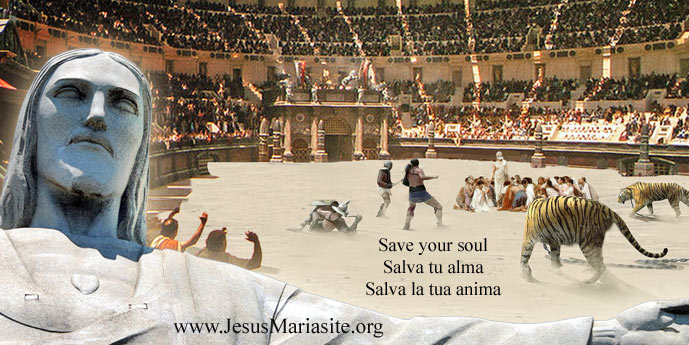
Maria Valtorta: “…A time of persecution, one of the greatest persecutions, for the Christians are tortured in large numbers, not taken individually. The place is the cavea of a Circus. In short, it is a kind of room situated under the tiers used as a shelter for gladiators, animal keepers, and all the Circus staff.
[…] In this spacious, but dark room the only light is from a door opening into a corridor which surely leads inside the Circus, and perhaps outside, and from a small window which I would call a low loophole, at the Circus’ ground level, from which the noise of a crowd emerges many, many Christians of all ages are grouped together From children of a very tender age, still in their mothers’ arms two of them, though about two years old, are still sucking at their mother’s depleted breast to the feeble elderly.
And there are also gladiators, already wearing helmets and the corresponding body armor which both defends and does not defend, for it leaves some vital parts still unprotected, such as the throat or sections of the abdomen where the liver and spleen are located. They put this armor on over their bare skin and hold short and long daggers almost in the shape of a chestnut leaf. They are very handsome men, not so much on account of their faces as because of their strapping, harmonious bodies the brisk rippling of their muscles is visible with every movement.
Some have scars from old wounds, while others display no sign of lacerations. They speak to one another, and I note that they must be from countries subject to Rome, surely prisoners of war, for they use only a very hybrid Latin, pronounced in a harsh, guttural manner, when they address the Christians waiting to die who are singing their sweet, sad hymns.
One gladiator, almost two meters in height a real colossus as golden as honey, with clear gray blue eyes which are gentle even in the dark iron shadow cast over his face by the visor of his helmet addresses an old man dressed entirely in white, dignified and austere or, rather, ascetic whom all the Christians venerate with the maximum respect.”
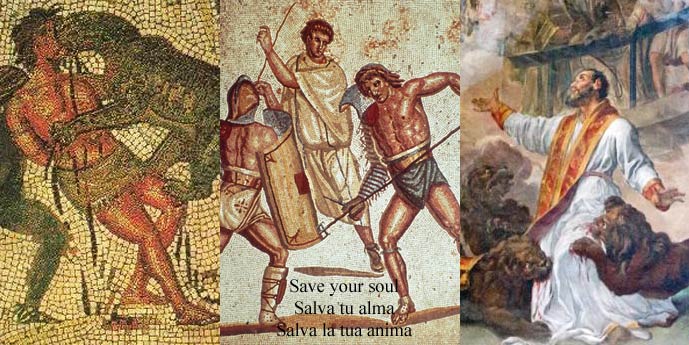
(Gladiator): “White father, if the beasts spare you, I’ll have to slay you. Those are the orders. And I am sorry, since I left an elderly father like you in Pannonia.”
(Priest): “Don’t be grieved, son. You are opening Heaven for me. And in my long life I have never received a more beautiful gift from anyone than the one you are giving me.”
(G.): “In Heaven, too, a place where your God surely exists as in mine our gods exist, and in Rome’s, theirs there is still death and struggle. Do you want to go on suffering because of the gods’ hatred as you suffer here?”
(P.): “My God is the only one. In his Heaven He reigns with love and justice. And whoever arrives there, experiences only eternal rejoicing.”
(G.): “I have heard that from many Christians during this persecution. And I said to a girl who was smiling at me as I brought the dagger down upon her…. And I pretended to kill her, but I didn’t kill her in order to save her, since she was tender and blond like young heather in my forests…. But it was of no use to me… I couldn’t take her away from here, and the next day … that body of milk and roses was given to the snakes…” (The man grows silent with a sad look).
(P.): “What did you say to her, son?” (asks the old man).
(P.): “I said, ‘Do you see? I am not bad. But it is my job. I am a slave of war. If it is true that your God is just, tell Him to remember Albulus that’s what they call me in Rome and to appear with his goodness.’ She said to me, ‘I will.’ But she has been dead for days, and no one has come.”
(P.): “As long as you are not a Christian, God will show Himself to you only in his servants. And how many of them He has brought to you! Every Christian is a servant of God; every martyr, a friend a friend to the point of living in God’s arms.”
(G.): “Oh, many… And I, not I alone, but also Dacius and Illiricus, and others among us, too sad about our fortune, have been caught up by your rejoicing… and would like to share it. You are in chains… We are not. But not even our breath is free. If Caesar wills, they will chain up our breath and kill us. Are you filled with disgust by our talk of God?”
(P.): “It is my only earthly joy, son, and it is a great one. May Jesus, my God and Master, bless you for it. I am a priest, Albulus. I have consumed my life preaching Him and taking many creatures to Him. And I no longer hoped to receive this joy. Listen…”
(MV): “And the old man repeats the life of Jesus to him and the other gladiators who have formed a circle around them, from his birth to his death on the cross, and he outlines the essential requirements of the Faith. He speaks sitting on a rock serving as a bench peaceful, solemn, totally radiant, with his long hair, Mosaic beard, and robe, totally aflame in his gaze and words. He interrupts himself on two occasions alone to bless two groups of Christians brought into the arena to be fed to the crocodiles during the naval games. He then resumes speaking in the ring of sturdy gladiators nearly all are blond, with a rosy complex ion who listen to him with their mouths open. […] He concludes by saying:
(P.): “This is what’s essential to believe in order to receive Baptism and Heaven.”
(MV): “The robust voices of the gladiators ten of them make the low vault boom:
(Gladiators): “We believe. Give us your God.”
(P): “I have nothing to sprinkle you with, not a drop of water or any other liquid, and my time has come. But you will find a way…. No! God is telling me! A liquid is ready for you.”
- “The Christians to the lions! (Orders the guard) All of you.”
(MV): “The old priest at the head and the others behind including the mothers, on whose breasts the children have fallen asleep go into the arena, singing.
What a crowd! What light! What noise! How many colors! It is incredibly packed with people of every extraction. In the section flooded by sunlight there are lower class, noisy folk; in the shaded section are the patricians. Toga after toga, ostrich fans’ jewels, and sarcastic and more subdued conversations. In the center of the shaded section is the imperial podium, with its purple canopy and its balustrade decked with flowers and covered with cloth and its soft seats for the repose of Caesar and the patricians and courtiers who are his guests. Two golden tripods are smoking at the extreme edges of the balcony and emitting rare fragrances. The Christians are pushed towards the sunny area.
[…] In the center of the arena is a […] marble structure from which there rise up to the sky thin, wisp like spurts of water, and on this structure’s platform in the shape of an elongated oval, barely two meters above the ground are small golden statues of gods, and tripods in which incense is burning stand before them. The Christians are then grouped together in the sunlit area.
[…] The lions burst in. The elderly priest is the first to advance, alone, with his arms extended. He speaks:
(P.): “Romans, for the sake of my brothers and sisters and myself, peace and blessing. May Jesus, because of the joy you give us of confessing Him with our blood, give you Light and eternal Life. We pray to Him for this because we are grateful to you for the eternal purple with which you robe us with the… “
(MV): “A lion has leaped forward after having approached, nearly crawling along the ground, and knocks him down, biting his shoulder. His snow-white robe and hair are now completely red.
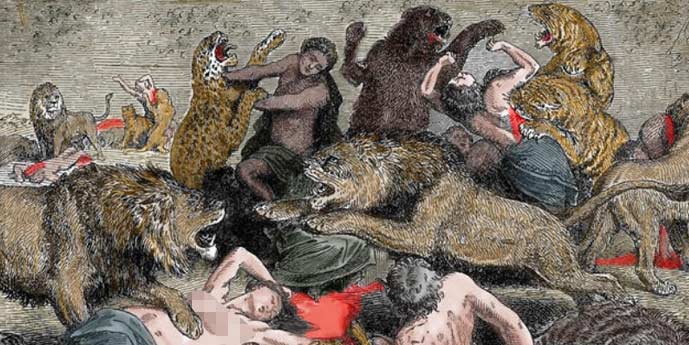
It is the signal for the beastly attack. The pack of brutes leaps upon the flock of the gentle. With a blow of her paw, a lioness tears one of the sleeping babies away from her mother, and the blow is so fierce that it rips out part of the breast of the mother, who collapses onto the arena and dies, perhaps lacerated right to her heart. The beast, striking blows with her paws and tail, defends her tender meal and crunches it in a flash. A little red stain remains on the sand, the only trace of the martyred baby, as the beast gets up, licking her muzzle.
But there are a lot of Christians and few animals in comparison. And they are perhaps already sated. Rather than devour, they kill for the sake of killing. They knock down, tear throats, rip open bellies, lick a bit, and then move on to another prey.
The people get restless because there is no reaction by the Christians and the brutes are not sufficiently ferocious. They howl:
- (Crowd): “Death to them! Death to them! Death to the superintendent, too! These are not lions, but well-fed dogs. Death to the betrayers of Rome and Caesar!”
(MV): “The emperor gives an order, and the beasts are driven back into their caves. The gladiators are brought in for the coup de grace. The crowd yells out the names of their favorites:
- (Crowd): “Albulus, Illiricus, Datius, Hercules, Polyphemus, Tratius,” (and others, too).
They are not just the gladiators spoken to by the elderly martyr, who is agonizing in the arena, with one lung nearly exposed by a clawing, but others as well who come in from elsewhere. Albulus runs over to the old priest. The people say:
- (Crowd): “Make him suffer! Lift him up for the blow to be seen! Come on, Albulus! “
But Albulus bends over to ask the old man something and, on receiving a sign of consent, calls the companions who previously heard the old priest speak. I cannot manage to understand what they do whether they obtain a blessing or what since their robust bodies form a sort of roof over the old man, lying prostrate. But I do understand when I see that an aged, now trembling hand rises over the group of heads pressed close together and sprinkles them with the blood it has been filled with like a cup. It then falls back down.
The gladiators, sprinkled with that blood, leap to their feet and raise their daggers, shining in the light. They yell out:
- (Gladiators): “Hail, Caesar, Emperor. The victors greet you.”
(MV): “And then, as fast as a lightning bolt, they run to that structure in the middle of the circus, leap upon it, overturn idols and tripods, and trample upon them.
The crowd howls as if crazed. Some would like to defend their favorite gladiator and some call down an atrocious death upon the new Christians, who, for their part, having returned to the arena, stand in a line, serene and magnificent, like statues of giants, with a fresh smile on their fierce faces.
Caesar, […] crowned with flowers and dressed in purple, stands up in the circle of his patricians, all dressed in white. Only some have red frills. The crowd grows silent, waiting for his words. […] He keeps everyone in suspense for a few minutes and then turns his thumb downwards, saying:
- “Let them be killed by their companions.”
(MV): “The unconverted gladiators, who have meanwhile slashed the throats of the barely surviving Christians as methodically as a butcher cuts lambs’ throats, rise up, and with the same automatic coldness and precision they open their companions’ throats at the jugular vein. Like a bundle of ears of grain which the pruning hook cuts down stele by stele, the ten neo-Christians, sprinkled with the blood of the martyred priest, make themselves a robe of eternal purple with their blood and fall with a smile on their backs, gazing at heaven, where their blessed day is dawning.
[…] The vision of the elderly martyred priest and of the last ones he baptized remains in my heart…”
Maria Valtorta: The Notebooks

 “These Notebooks belong to a category of mystical literature which the Catholic Church has long been familiar with: that of so-called “private revelations.” A private revelation is not binding for the faith of Christians, but its value is to be measured by its capacity to instruct and inflame souls, spurring them to love God more and apply divine teachings to their everyday lives. In the confidence—and the conviction—that this work superabounds in these inspired qualities, we offer it for the spiritual nourishment of readers. —David Murray
“These Notebooks belong to a category of mystical literature which the Catholic Church has long been familiar with: that of so-called “private revelations.” A private revelation is not binding for the faith of Christians, but its value is to be measured by its capacity to instruct and inflame souls, spurring them to love God more and apply divine teachings to their everyday lives. In the confidence—and the conviction—that this work superabounds in these inspired qualities, we offer it for the spiritual nourishment of readers. —David Murray
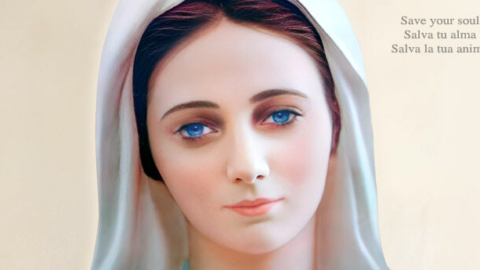

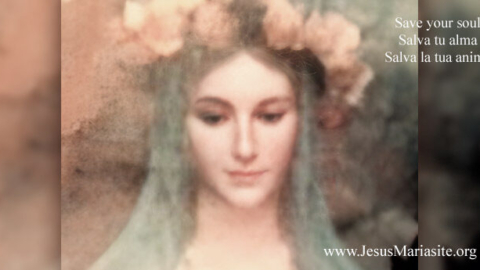

















 Pray for the Church, its Hierarchies, the validly ordained and consecrated during this time of confusion and apostasy. Do not fall into the trap of division, even with apparent good reasons. Turn your eyes to the lives of saints, such as St. Martin de Porres, St. Padre Pio of Pietrelcina, the former discriminated against and the latter fought by the same institution. Let their behavior in adversity be an example for you to follow…
Pray for the Church, its Hierarchies, the validly ordained and consecrated during this time of confusion and apostasy. Do not fall into the trap of division, even with apparent good reasons. Turn your eyes to the lives of saints, such as St. Martin de Porres, St. Padre Pio of Pietrelcina, the former discriminated against and the latter fought by the same institution. Let their behavior in adversity be an example for you to follow…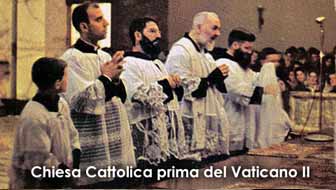
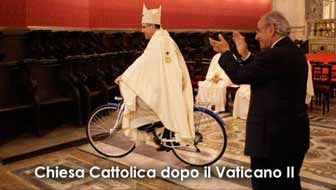
 “The Church is God’s house. It is forbidden for men to enter here with bare arms and wearing shorts. It is forbidden for women to enter wearing trousers, bare headed, with short, low-necked or sleeveless dresses.”
“The Church is God’s house. It is forbidden for men to enter here with bare arms and wearing shorts. It is forbidden for women to enter wearing trousers, bare headed, with short, low-necked or sleeveless dresses.”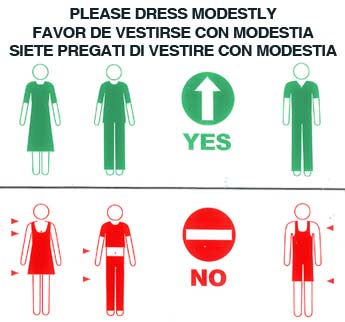
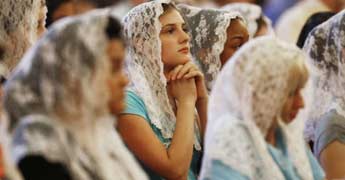
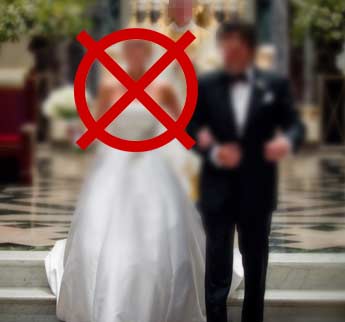

 “Parents, correct the ways if your family, have much dialogue with your children, make time to listen to them as many homes are being lost due to lack of love, dialogue, understanding and most specially for not inviting God. Take God back into your homes, pray my Holy Rosary, as the family that prays together stays together.”
“Parents, correct the ways if your family, have much dialogue with your children, make time to listen to them as many homes are being lost due to lack of love, dialogue, understanding and most specially for not inviting God. Take God back into your homes, pray my Holy Rosary, as the family that prays together stays together.” 




 January 31, 2022 "Heavenly Father, today, I surrender to You my heart. Help me to be Your instrument in the world. Cover me with the Precious Blood of Your Divine Son. Guard me against all evil. Protect me from any evil plan Satan may have for me today. Clothe me in Your Divine Will. Amen"
January 31, 2022 "Heavenly Father, today, I surrender to You my heart. Help me to be Your instrument in the world. Cover me with the Precious Blood of Your Divine Son. Guard me against all evil. Protect me from any evil plan Satan may have for me today. Clothe me in Your Divine Will. Amen"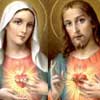 "O Hearts of Jesus and Mary; I consecrate myself, I consecrate my family and the whole world, to your Most Beloved Hearts. Listen to the supplication which I making to you and accept our hearts in Yours, to be delivered and protected we, the whole world, from all evil and all sin. May the protection of your Two Hearts be refuge, strength, and protection, in the daily spiritual struggles. That the power of your Two Hearts irradiates the world so that it is protected from evil and sin. We willingly consecrate ourselves and consecrate all mankind to your Hearts; sure and confident, for your Great Mercy, to obtain the victory over the forces of evil in this world, and the eternal Glory in the Kingdom of God. Amen"
"O Hearts of Jesus and Mary; I consecrate myself, I consecrate my family and the whole world, to your Most Beloved Hearts. Listen to the supplication which I making to you and accept our hearts in Yours, to be delivered and protected we, the whole world, from all evil and all sin. May the protection of your Two Hearts be refuge, strength, and protection, in the daily spiritual struggles. That the power of your Two Hearts irradiates the world so that it is protected from evil and sin. We willingly consecrate ourselves and consecrate all mankind to your Hearts; sure and confident, for your Great Mercy, to obtain the victory over the forces of evil in this world, and the eternal Glory in the Kingdom of God. Amen" "O Virgin of Carmel, may the power of your Holy Scapular take away from me the enemy of my soul; bless me, Mother of Carmel, and deliver me from all evil and danger in this world. I ask you O Mother, that in the hour of my death, your Holy Scapular frees me from the fury of the devil and in the eternity, of the eternal fire. Amen"
"O Virgin of Carmel, may the power of your Holy Scapular take away from me the enemy of my soul; bless me, Mother of Carmel, and deliver me from all evil and danger in this world. I ask you O Mother, that in the hour of my death, your Holy Scapular frees me from the fury of the devil and in the eternity, of the eternal fire. Amen" 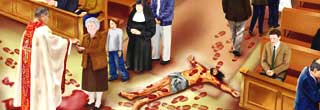
 "Oh Jesus of Divine Mercy, hear my pleadings to you, for I am here to do your Will"
"Oh Jesus of Divine Mercy, hear my pleadings to you, for I am here to do your Will" "O glorious St. Joseph! by your profound humility, by your unalterable meekness, by your invincible patience, by your angelic purity and perfect fidelity that made you a timely imitator of the virtues of Jesus and Mary, I ask you to console me in all my sorrows, to guide me in all my doubts, to defend me in all temptations, to deliver me from all spiritual and material dangers; to extend your arm against all my visible and invisible enemies, breaking and destroying all the snares and barriers that they tend and arm against me. Amen"
"O glorious St. Joseph! by your profound humility, by your unalterable meekness, by your invincible patience, by your angelic purity and perfect fidelity that made you a timely imitator of the virtues of Jesus and Mary, I ask you to console me in all my sorrows, to guide me in all my doubts, to defend me in all temptations, to deliver me from all spiritual and material dangers; to extend your arm against all my visible and invisible enemies, breaking and destroying all the snares and barriers that they tend and arm against me. Amen"  "Oh, blessed Saint Michael, protect us from the attacks and snares of the evil spirits because you know full well that we are poor mortals, fragile and weak, in need of the Mercy of God and of your protection to fulfill the mission that Heaven has commissioned to us. Oh, Saint Michael, may your victorious cry: “who is like God? no one is like God”, suppress and cast into Hell satan and all the evil spirits who prowl about the world seeking the destruction of souls. Amen"
"Oh, blessed Saint Michael, protect us from the attacks and snares of the evil spirits because you know full well that we are poor mortals, fragile and weak, in need of the Mercy of God and of your protection to fulfill the mission that Heaven has commissioned to us. Oh, Saint Michael, may your victorious cry: “who is like God? no one is like God”, suppress and cast into Hell satan and all the evil spirits who prowl about the world seeking the destruction of souls. Amen" Most sweet Jesus, redeemer of the human race, look down upon us, humbly prostrate before your altar. We are yours and yours we wish to be; but to be more surely united with you, behold each one of us freely consecrates himself today to your most sacred heart. Many, indeed, have never known you, many too, despising your precepts, have rejected you. Have mercy on them all, most merciful Jesus, and draw them to your sacred heart. Be you king, O Lord, not only of the faithful who have never forsaken you, but also of the prodigal children who have abandoned you; grant that they may quickly return to their father’s house, lest they die of wretchedness and hunger. Be you king of those who are deceived by erroneous opinions, or whom discord keeps aloof, and call them back to the harbor of truth and unity of faith, so that soon there may be but one flock and one shepherd. Be you king also of all those who sit in the ancient superstition of the Gentiles, and refuse not you to deliver them out of darkness into the light and kingdom of God. Grant, O Lord, to your Church, assurance of freedom and immunity from harm; give peace and order to all nations, and make the earth resound from pole to pole with one cry: Praise to the divine heart that wrought our salvation; to it be glory and honor forever. Amen.
Most sweet Jesus, redeemer of the human race, look down upon us, humbly prostrate before your altar. We are yours and yours we wish to be; but to be more surely united with you, behold each one of us freely consecrates himself today to your most sacred heart. Many, indeed, have never known you, many too, despising your precepts, have rejected you. Have mercy on them all, most merciful Jesus, and draw them to your sacred heart. Be you king, O Lord, not only of the faithful who have never forsaken you, but also of the prodigal children who have abandoned you; grant that they may quickly return to their father’s house, lest they die of wretchedness and hunger. Be you king of those who are deceived by erroneous opinions, or whom discord keeps aloof, and call them back to the harbor of truth and unity of faith, so that soon there may be but one flock and one shepherd. Be you king also of all those who sit in the ancient superstition of the Gentiles, and refuse not you to deliver them out of darkness into the light and kingdom of God. Grant, O Lord, to your Church, assurance of freedom and immunity from harm; give peace and order to all nations, and make the earth resound from pole to pole with one cry: Praise to the divine heart that wrought our salvation; to it be glory and honor forever. Amen.